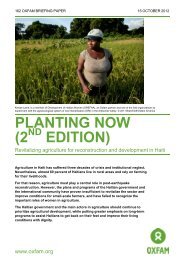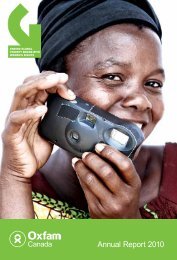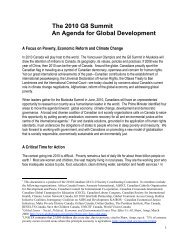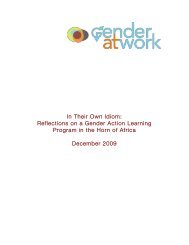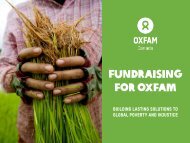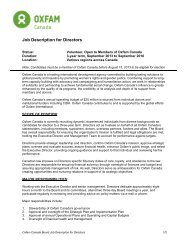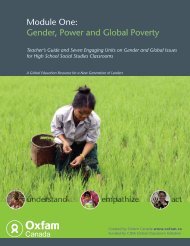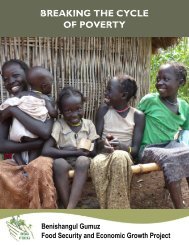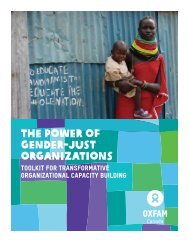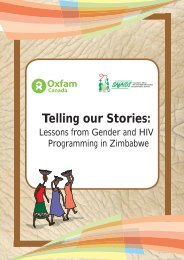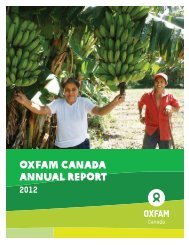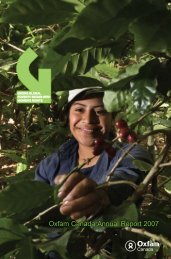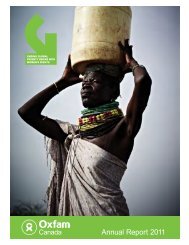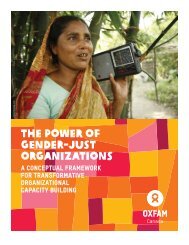The New Forests Company and its Uganda ... - Oxfam Canada
The New Forests Company and its Uganda ... - Oxfam Canada
The New Forests Company and its Uganda ... - Oxfam Canada
You also want an ePaper? Increase the reach of your titles
YUMPU automatically turns print PDFs into web optimized ePapers that Google loves.
W<br />
hen the <strong>New</strong> <strong>Forests</strong> <strong>Company</strong> (NFC) was formed in 2004 <strong>its</strong> management’s aim<br />
was for it to become East Africa’s biggest forester. <strong>The</strong> UK-registered company has<br />
achieved that, along the way building <strong>its</strong>elf a high-powered <strong>and</strong> influential corporate CV. 1<br />
Today, the NFC plants <strong>and</strong> harvests timber on 27,000 hectares of ‘underutilized <strong>and</strong>/or<br />
degraded’ l<strong>and</strong> in Ug<strong>and</strong>a, Tanzania, Mozambique, <strong>and</strong> Rw<strong>and</strong>a; it has deals in those<br />
countries totalling around 90,000 hectares. 2 <strong>The</strong> plantations contribute jobs <strong>and</strong> revenue,<br />
along with the timber products those countries need as they develop <strong>and</strong> which would<br />
otherwise be logged from natural forests. NFC hopes to attract more revenue from<br />
carbon cred<strong>its</strong>, obliging the company to submit a full Project Design Document to the<br />
UN’s Clean Development Mechanism. 3 In 2008, the Ug<strong>and</strong>a Investment Authority named<br />
NFC an ‘Investor of the Year’. 4 <strong>The</strong> Forest Stewardship Council (FSC) – the global gold<br />
st<strong>and</strong>ard for forestry best practice – has certified two of NFC’s Ug<strong>and</strong>an plantations. 5 <strong>The</strong><br />
company has strong political ties in the countries where it works, from central government<br />
down to local level. NFC has attracted investment from international banks <strong>and</strong> private<br />
equity funds since 2008. <strong>The</strong> European Investment Bank (EIB), the EU’s financing<br />
institution, has loaned NFC five million Euros to exp<strong>and</strong> one of <strong>its</strong> Ug<strong>and</strong>an plantations.<br />
Agri-Vie Agribusiness Fund, a private equity investment fund focused on food <strong>and</strong><br />
agribusiness in sub-Saharan Africa, has invested $6.7m in NFC. Agri-Vie is <strong>its</strong>elf backed<br />
by development finance institutions, notably the World Bank’s private sector lending arm,<br />
the International Finance Corporation (IFC). <strong>The</strong> most significant investment in NFC<br />
comes from HSBC (around $10m), which gives HSBC 20 per cent ownership of the<br />
company <strong>and</strong> one of six seats on the NFC Board. <strong>The</strong>se investors have social <strong>and</strong><br />
environmental st<strong>and</strong>ards to maintain in administering their own portfolios.<br />
NFC runs education, health, <strong>and</strong> income-generation programmes with local communities;<br />
in Ug<strong>and</strong>a, for example, it has built school rooms, health clinics, wells, <strong>and</strong> latrines, <strong>and</strong><br />
runs literacy programmes <strong>and</strong> tree out-sourcing schemes which are ‘dem<strong>and</strong>-driven’ <strong>and</strong><br />
‘locally-owned’. 6 <strong>The</strong> company says it is now developing a system to quantify the positive<br />
social impacts that it ‘anecdotally <strong>and</strong> theoretically’ knows are already happening as a<br />
result of <strong>its</strong> investments. 7<br />
L<strong>and</strong> has always been a contentious <strong>and</strong> emotive issue, even more so today given fierce<br />
competition over <strong>its</strong> use <strong>and</strong> spiralling value – <strong>and</strong> particularly so in Africa. NFC appears,<br />
on the face of it, to be the design blueprint for how a young modern business can conduct<br />
a major l<strong>and</strong> investment in Africa in a responsible <strong>and</strong> ethical way. It has economic<br />
power, professional expertise, <strong>and</strong> close political support. It has a h<strong>and</strong>s-on chief<br />
executive with local knowledge <strong>and</strong> ethical credentials. 8 <strong>The</strong> company <strong>and</strong> <strong>its</strong> investors<br />
have clear environmental <strong>and</strong> social st<strong>and</strong>ards they commit to uphold <strong>and</strong> has corporate<br />
social responsibility <strong>and</strong> accountability principles embedded at the heart of <strong>its</strong> operations. 9<br />
Given all this, how is it possible that thous<strong>and</strong>s of people in affected communities have<br />
alleged that l<strong>and</strong> clearances, which have taken place to make way for NFC’s operations<br />
in Ug<strong>and</strong>a, have been accompanied by distress <strong>and</strong> violence, <strong>and</strong> have left many in a<br />
state of poverty<br />
‘I<br />
remember my l<strong>and</strong>, three acres of coffee, many trees – mangoes <strong>and</strong> avocados. I had<br />
five acres of banana,’ Francis Longoli says. ‘I was given awards as a model farmer. I<br />
had cows for milk, ten beehives, two beautiful permanent houses. My l<strong>and</strong> gave me<br />
everything from my living to my children’s education. People used to call me Omataka –<br />
someone who owns l<strong>and</strong>. Now that is no more. I am one of the poorest now.’ 10<br />
Francis is among more than twenty thous<strong>and</strong> people 11 who have been evicted from their<br />
homes <strong>and</strong> l<strong>and</strong> in Kiboga district, <strong>and</strong> in nearby Mubende district, to make way for NFC<br />
plantations.<br />
<strong>The</strong> Ug<strong>and</strong>an National Forestry Authority (NFA) granted licences over the plantation<br />
areas to NFC in 2005 <strong>and</strong> embarked on procedures to remove the former residents,<br />
which it claimed were ‘illegal encroachers’. 12 This had taken place by February 2010 in<br />
Mubende <strong>and</strong> between 2006 <strong>and</strong> July 2010 in Kiboga. 13 <strong>Oxfam</strong>’s research estimates that<br />
2<br />
<strong>The</strong> <strong>New</strong> <strong>Forests</strong> <strong>Company</strong> <strong>and</strong> <strong>its</strong> Ug<strong>and</strong>a plantations<br />
<strong>Oxfam</strong> Case Study, September 2011



